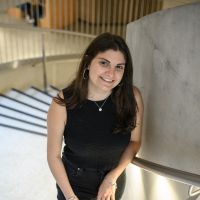5 min read
We sat down with Manu, who took the course IR207: Development in the International Political Economy in 2023, to hear about her experience of the course - from meeting fellow students to the teaching style.
Why did you decide to attend LSE Summer School?
I knew LSE was a top school in the area of development and international affairs and I have always wondered what the university and classes were like. As a final-year undergraduate student, I knew I wanted to do my master's in London, and LSE's Summer School seemed like the perfect opportunity to explore the city, get to know the university, its opportunities, professors, and prepare for my master's application.
Why did you choose IR207?
As a student of international affairs and business, I was looking for a class that would combine different economic theories with current and social challenges, such as gender, poor governance, and climate disasters. IR207 did exactly that! It was a very complete and complex course that gave the students a clear overview of all the different areas in which development operates.
Tell us about an average day as a student on IR207.
During the course, we had a combination of daily lectures and seminars. On an average day, I would wake up at 8:30 am, have breakfast at LSE's Passfield Hall - where I was staying for the three weeks - and go to our seminar, which would be either at 10 or 11 am. The seminar lasted 1 hour and 30 minutes and it was where we discussed and reflected on the lectures and readings from the previous day. There, we also had group presentations and writing workshops.
After our seminar in the morning, I would go around LSE's campus to have lunch with my friends. At 14:00, we would have our daily lecture, which lasted 3 hours, with 15-30 minute breaks. They would end at around 17:30 and after I would go to the library to study for a bit, meet some friends, and go for dinner.
What was your favourite part of IR207?
My favourite part of IR207 were the seminar classes and the discussions we had every morning. To have such a diverse and international group of people engaging in deep discussions on development was super inspiring and refreshing. It was also an amazing way to meet new people and make friends!
What advice would you give to students considering IR207?
This course gives you a great overview of all the different spheres of development, giving you the right tools to better understand very complex issues that involve many variables such as poor governance, vulnerability, and natural disasters. One piece of advice I would give to students considering IR207 is to really put themselves out there and be curious about the different relationships and connections between global issues and local and regional challenges.
What are your short-term professional goals, and how does IR207 contribute to these goals?
One of my main goals is to build a career in international development, with a focus on sustainability in Latin America, especially Brazil. This course was crucial for me to realize that I truly want to study development and pursue a Master's in Development Management. IR207 gave me a fresh perspective on the topic, also giving me access to amazing scholars and professors who have truly helped and supported me with different questions and doubts.
Was meeting and talking to other students on your course easy?
With no doubt, my favourite thing about LSE's Summer School was the people I met. During our seminars, we were divided into very small discussion groups, so it was really easy to get to know and connect with my classmates, who actually became my best friends. I really enjoyed the structure of the course and how we were always encouraged to discuss topics with each other, which allowed me to learn a lot and develop great friendships!
How would you explain IR207 to someone who has never heard of it?
IR207 gives you a great overview of what development means to different scholars, institutions, and countries around the world. In the first part of the course, we went over important theories that explain and elaborate on the economic and social background necessary for the study of development. Then, in the second and third weeks, we went over all the different areas in which development can take place, including the environment, gender, and food and agriculture.
How has IR207 helped you in your undergraduate degree/career plans?
Taking the course IR207: Development in the International Political Economy was essential for my increasing interest in the area of international development and management. As a Brazilian studying international affairs and business, I aspire to build a career in sustainable development and management, and this course allowed me to truly understand what a career in that area would look like.
Did you feel supported by your lecturers?
The professors were amazing. Both of my professors, Tim Forsyth and Jorich Loubser, were extremely attentive to the students, always making sure we were engaging with the material, asking provocative questions, and clarifying really complex concepts. They were also super supportive of our final essays and exams, being also very open in case you were interested in other LSE programmes, such as master's and PhD’s.

